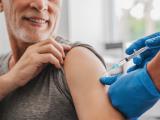A study of the single-dose respiratory syncytial virus (RSV) vaccine in older adults shows that vaccine efficacy waned across three RSV seasons but suggests a booster vaccination dose 1 year after initial vaccination did little to provide additional efficacy.
The study, a phase 3 clinical trial on GSK's Arexvy (adjuvanted RSV prefusion F protein-based vaccine [RSVPreF3 OA]), was published last week in The Lancet Respiratory Medicine.
Though several clinical trials concerning RSV vaccines in older adults and pregnant women have been published since the vaccines first became available in 2023, this is one of the first tracking efficacy over subsequent RSV seasons.
Participants in the study were enrolled between May 25, 2021, and January 31, 2022, and the trial ended on May 31, 2024. The exposed population included 24,972 participants: 12,469 received RSVPreF3 OA, and 12,503 received a placebo before the first RSV season.
Efficacy of 62% in preventing RSV
Of the vaccine recipients, 4,988 received a placebo dose (RSV single-dose group) and 4,968 a second RSVPreF3 OA dose (RSV revaccination group) before RSV season two. The average age of the participants was 69.5 years, and 44% were 70 years or older.
The cumulative efficacy of a single RSVPreF3 OA dose in preventing RSV-related lower respiratory tract disease over three RSV seasons was 62.9% (97.5% confidence interval [CI], 46.7% to 74.8%). Efficacy over three seasons was 51.1% (95% CI, 40.3% to 60.2%) against RSV-related acute respiratory illness.
Overall, efficacy against RSV infections was highest during season one and against RSV A infections (69.8%) compared to RSV B infections (58.6%).
“A decrease was observed from season one to season three, with a lesser decline between seasons two and three than between seasons one and two,” the authors, some of whom are GSK scientists, wrote. In season one, efficacy was 82.6%, then dropped to 56.1% in season two and 48.0% in season three.
In season three, the efficacy of the booster-dose group was 68.4% (95% CI, 24.6% to 89.1%).
Efficacy estimates for the revaccination regimen were generally in the same range as those observed for a single dose.
“Efficacy estimates for the revaccination regimen were generally in the same range as those observed for a single dose, although point estimates for the revaccination regimen were higher for several endpoints,” the authors said.
Questions direct future study
In a commentary on the study, Farina Shaaban, MD, and Louis Bont, MD, of the University Medical Center Utrecht in the Netherlands, said the study illustrates the concerns around achieving long-term RSV protection for older adults. They suggest five areas of study needed to understand lasting immunity against RSV, including a knowledge gap between RSV immunization and immune-mediated neuropathies (including Guillain-Barre syndrome).
They also wrote that countries have conflicting guidelines about the usefulness of booster doses in pregnant women, which echoes the concerns seen with booster doses and older adults in this study.
“Efforts are needed to better understand the gaps in knowledge that these questions highlight,” they wrote. Despite these gaps, they argued it was time for the global introduction of RSV immunization.




















